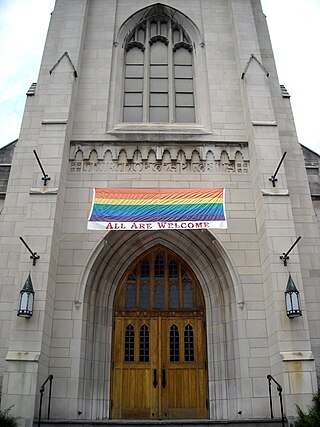Secularism is the principle of seeking to conduct human affairs based on naturalistic considerations, uninvolved with religion.

Secular humanism is a philosophy, belief system, or life stance that embraces human reason, logic, secular ethics, and philosophical naturalism, while specifically rejecting religious dogma, supernaturalism, and superstition as the basis of morality and decision-making.

Charles Margrave Taylor is a Canadian philosopher from Montreal, Quebec, and professor emeritus at McGill University best known for his contributions to political philosophy, the philosophy of social science, the history of philosophy, and intellectual history. His work has earned him the Kyoto Prize, the Templeton Prize, the Berggruen Prize for Philosophy, and the John W. Kluge Prize.
Irreligion is the absence or rejection of religious beliefs or practices. It encompasses a wide range of viewpoints drawn from various philosophical and intellectual perspectives, including atheism, agnosticism, skepticism, rationalism, and secularism. These perspectives can vary, with individuals who identify as irreligious holding a diverse array of specific beliefs about religion or its role in their lives.
Nontheism or non-theism is a range of both religious and non-religious attitudes characterized by the absence of espoused belief in the existence of God or gods. Nontheism has generally been used to describe apathy or silence towards the subject of gods and differs from atheism, or active disbelief in any gods. It has been used as an umbrella term for summarizing various distinct and even mutually exclusive positions, such as agnosticism, ignosticism, ietsism, skepticism, pantheism, pandeism, transtheism, atheism, and apatheism. It is in use in the fields of Christian apologetics and general liberal theology.

Progressive Christianity represents a postmodern theological approach, which developed out of the liberal Christianity of the modern era, itself rooted in the Enlightenment's thinking. Progressive Christianity is a postliberal theological movement within Christianity that, in the words of Reverend Roger Wolsey, "seeks to reform the faith via the insights of post-modernism and a reclaiming of the truth beyond the verifiable historicity and factuality of the passages in the Bible by affirming the truths within the stories that may not have actually happened."

George Jacob Holyoake was an English secularist, co-operator and newspaper editor. He coined the terms secularism in 1851 and "jingoism" in 1878. He edited a secularist paper, the Reasoner, from 1846 to June 1861, and a co-operative one, The English Leader, in 1864–1867.

The Center for Inquiry (CFI) is a U.S. nonprofit organization that works to mitigate belief in pseudoscience and the paranormal and to fight the influence of religion in government.

George William Foote was an English secularist, freethinker, republican, writer and journal editor.
Secular ethics is a branch of moral philosophy in which ethics is based solely on human faculties such as logic, empathy, reason or moral intuition, and not derived from belief in supernatural revelation or guidance—a source of ethics in many religions. Secular ethics refers to any ethical system that does not draw on the supernatural, and includes humanism, secularism and freethinking. A classical example of literature on secular ethics is the Kural text, authored by the ancient Indian philosopher Valluvar.

Leicester Secular Society is the world's oldest Secular Society. It meets at its headquarters, the Leicester Secular Hall in the centre of Leicester, England, at 75 Humberstone Gate.

The following outline is provided as an overview of and topical guide to humanism:
Postsecularism refers to a range of theories regarding the persistence or resurgence of religious beliefs or practices in the present. The "post-" may refer to after the end of secularism or after the beginning of secularism.
William Chilton, was a printer, Owenite, evolutionist, and co-founder with Charles Southwell of The Oracle of Reason, which claimed to be the world's first avowedly atheist journal.
Meera Nanda is an Indian writer and historian of science, who has authored several works critiquing the influence of Hindutva, postcolonialism and postmodernism on science, and the flourishing of pseudoscience and vedic science. Meera Nanda taught History of Science at the Indian Institute of Science Education and Research (IISER) Mohali from 2009 to 2017, and later - from 2019 to 2020 - she was a Guest Faculty in Humanities and Social Sciences at IISER Pune. In 2023 she became a fellow with the Committee for Skeptical Inquiry.
Karen Hagemann is a German-American historian. She holds the James G. Kenan Distinguished Professor chair at the University of North Carolina at Chapel Hill. Her research focuses on Modern German, European and Transatlantic history, the history of military and war and women’s and gender history.

Secular Review (1876–1907) was a freethought/secularist weekly publication in nineteenth and early twentieth-century Britain that appeared under a variety of names. It represented a "relatively moderate style of Secularism," more open to old Owenite and new socialist influences in contrast to the individualism and social conservatism of Charles Bradlaugh and his National Reformer. It was edited during the period 1882–1906 by William Stewart Ross (1844–1906), who signed himself "Saladin."
Regina Schwartz is a scholar of English literature and elements of Jewish and Christian religion. A Professor of English and Religion at Northwestern University, she has been known historically for her research and teaching on 17th-century literature, on the Hebrew Bible, and on the interface of literature with the subjects of philosophy, law, and religion.
Ratna Kapur is a law professor and former director of the Center for Feminist Legal Research in New Delhi, India (1995–2012).
The Anti-Persecution Union was a British organisation established by the freethinkers George Jacob Holyoake and Emma Martin in 1842, to aid in defending individuals accused of blasphemy and blasphemous libel. Its object was "to assert and maintain the right of free discussion, and to protect and defend the victims of intolerance and bigotry".







